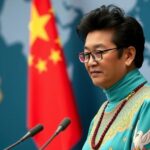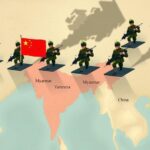Politics
ASIA, BEIJING, CHINA, DIPLOMACY, DIPLOMATIC RELATIONS, HUMAN TRAFFICKING, INFRASTRUCTURE PROJECTS, INTERNATIONAL RELATIONS, LOWY INSTITUTE, MEXICO, MYANMAR, NARESUAN UNIVERSITY, NORTH AMERICA, PAETONGTARN, PAUL CHAMBERS, RAHMAN YAACOB, UNITED STATES, VOA, WANG XING, WASHINGTON, XI JINPING
Omar El-Sharif
Thai Prime Minister’s Visit to China: Strengthening Ties Amid Global Uncertainties
Thailand’s Prime Minister Paetongtarn Shinawatra is visiting China to strengthen economic and trade ties, address safety concerns for Chinese tourists, and promote cooperative efforts against cyber scams. His agenda includes discussions on infrastructure development, particularly a high-speed rail project. The visit seeks to assure Beijing of Thailand’s commitment to addressing tourist safety while navigating relations with the U.S.
Thailand’s Prime Minister Paetongtarn Shinawatra has embarked on a four-day visit to China, aimed primarily at enhancing economic and trade relations. This trip also includes a meeting with Chinese President Xi Jinping, during which the prime minister is expected to address concerns over the safety of Chinese tourists in Thailand. Recent incidents, including the abduction of Chinese actor Wang Xing, have raised apprehensions among potential visitors from China.
In a bid to reassure Chinese officials, Prime Minister Shinawatra’s delegation intends to demonstrate Thailand’s commitment to combating cyber scams and enhancing cooperation in law enforcement. The increasing collaboration between Thai and Chinese authorities, particularly in addressing the cyber scam landscape along the Thailand-Myanmar border, is expected to foster confidence among travelers. Analysts suggest that this visit provides an opportunity for Thailand to alleviate fears associated with safety for its Chinese visitors.
In addition to security issues, the Thai Prime Minister’s agenda includes strengthening infrastructure partnerships with China, particularly regarding the proposed high-speed rail project connecting Thailand to southern China via Laos. This project is anticipated to bolster regional connectivity and is seen as beneficial for both nations. Thailand’s initiative to incorporate new infrastructure projects could serve to further solidify its relationship with China while addressing the country’s economic recovery needs.
However, the influx of inexpensive Chinese goods presents challenges for Thai businesses, prompting the government to establish regulations to mitigate competition. Experts emphasize the need for Thailand to balance trade issues against potential benefits offered by Chinese investments that could stimulate job creation. Pragmatic cooperation in trading and investment would allow Thailand to maximize the bilateral relationship while addressing local market concerns.
As the Thai government navigates its foreign policy, particularly concerning the sensitive issue of Uyghur detainees, there are implications for regional diplomacy. Analyst perspectives suggest that Thailand might seek concessions from China while maintaining a diplomatic stance with the United States. Ultimately, Thailand’s ongoing balancing act between the two powers may shape its future discussions and agreements with both China and the U.S.
In conclusion, Prime Minister Paetongtarn Shinawatra’s visit to China is a significant step in fortifying Thailand’s economic ties while addressing security concerns over tourist safety. The collaboration on combating cyber scams, infrastructure development, and regional diplomacy will be crucial for Thailand as it positions itself between the interests of the U.S. and China. This visit not only seeks to reassure Chinese tourists but also represents an opportunity to strengthen bilateral relations in a rapidly evolving global context.
Thailand’s diplomatic and economic relationship with China has become increasingly significant, especially in light of recent issues surrounding the safety of tourists from China and economic recovery following the COVID-19 pandemic. The Thai government has been proactive in addressing criminals exploiting tourists while seeking assistance from Chinese authorities to ensure improved safety measures. The focus on infrastructure development highlights Thailand’s strategic interests in fostering regional connectivity and attracting Chinese investments to support its economy. As the regional dynamics shift, Thailand’s foreign policy continues to balance relations with both China and the United States amid growing geopolitical concerns.
The trip by Prime Minister Paetongtarn Shinawatra to China underscores Thailand’s efforts to enhance economic cooperation and address security concerns affecting Chinese tourists. By focusing on collaborative initiatives against cyber scams, promoting infrastructure projects, and navigating its diplomatic relations, Thailand is strategically positioning itself to boost tourism and maintain a balanced approach toward its key regional partners. The outcomes of this visit could have lasting implications for Thailand’s economy and its role within Southeast Asia.
Original Source: www.voanews.com








Post Comment